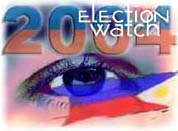|
|
|
 The
Presidentiables The
Presidentiables
The next Philippine
elections are still more than a year away – 16 months to be exact –
yet surveys of presidentiables, declarations of candidacy (or
non-candidacy) and slimy exchanges of accusations already bombard the
public. Whether we like it or not, the election fever is intensifying
and it is best to be prepared rather than be manipulated by unscrupulous
media spins and political maneuvers. Thus, Election Watch will feature
articles related to the political circus called elections. This week, we
are posting brief sketches of the survey topnotchers.
|
The
President's Daughter
By
Alexander Martin Remollino
Bulatlat.com
Gloria Macapagal-Arroyo is the first presidential daughter to become a president
herself. Her father, the late Diosdado Macapagal Sr., served as Philippine
president from 1961 to 1965. She was catapulted to the presidency in January
2001 by a popular uprising against then President Joseph Ejercito Estrada.
Her biography in her official website says she descended from the Pampango
nobleman Carlos Lakandula. When Estrada followers taunted her with the moniker
“Gloria Labandera,” alluding to a ditty about a laundrywoman, she
replied that she in fact hailed from a family of laundrywomen and was proud of
it. She frequently cites as her political idol her father, who was fond of
calling himself "the poor boy from Lubao."
 She took most of her pre-university education at the Assumption College, where
Senators Loren Legarda-Leviste and Tessie Aquino-Oreta also studied. After a two-year stint at
Georgetown University, where former United States (U.S.) President Bill Clinton
was her classmate, she returned to Assumption and finished commerce with high
honors. She earned her masters degree in Economics at the Ateneo de Manila
University and doctorate at the University of the Philippines (UP).
She took most of her pre-university education at the Assumption College, where
Senators Loren Legarda-Leviste and Tessie Aquino-Oreta also studied. After a two-year stint at
Georgetown University, where former United States (U.S.) President Bill Clinton
was her classmate, she returned to Assumption and finished commerce with high
honors. She earned her masters degree in Economics at the Ateneo de Manila
University and doctorate at the University of the Philippines (UP).
In an interview with the now defunct Pinoy Times shortly after she became
president, Macapagal-Arroyo said she was involved in activism while in graduate
school at UP. That was shortly before the declaration of martial law, she said.
She recalled that Gary Olivar was then the leader of student activists at UP.
After graduate school, she taught economics at the Assumption College, and later
at Ateneo and UP.
During the Aquino administration, she joined the government service as assistant
secretary of the Department of Trade and Industry (DTI). She afterward became
executive director of the Garments and Textile Export Board and, later, DTI
undersecretary.
In 1992, she was elected senator, a feat she would repeat three years later. As
senator, she was a leading advocate of the General Agreement of Tarrifs and
Trade (GATT), an agreement that has been criticized by progressive quarters for
further opening the economy to the inroads of foreign investment without
developing local industries.
She was elected vice president in 1998. She also served as secretary of the
Social Welfare and Development department until her resignation in 2000.
As president, she has had to contend with a lot of issues against her. Critics
have condemned her seeming willingness to make compromises in the campaign
against corruption, as shown by her having expressed, in several instances,
readiness to accommodate the demands of the Estrada camp for special treatment.
Her
refusal to grant a P125 wage increase is a source of constant conflict between
her and the progressive labor movement. From 2001 to 2002, the government
registered the lowest rate of land redistribution since 1992. Militant groups
and their nationalist allies have consistently hit her for continuing the
globalist policies imposed by the International Monetary Fund and the World Bank
and for maintaining a subservient foreign policy, as shown by her ready approval
of the Balikatan military exercise and the Mutual Logistics Support Arrangement
(MLSA). Human rights groups have seen in her the capacity to match the human
rights record of the late dictator Ferdinand Marcos, and cite as proof the many
brutal killings of activists under her administration.
Having assumed the presidency in a manner beyond the electoral process, the
Constitution allows her to compete for another term in 2004. She has declared
that she will not run in 2004. However, observers have commented that she may
take back this declaration shortly before the elections, especially if her
popularity rating should rise again. She is after all, a Macapagal. In his time,
Macapagal the father took back his withdrawal from the presidential race after
an alleged popular clamor for his candidacy. Bulatlat.com
We
want to know what you think of this article.
|

